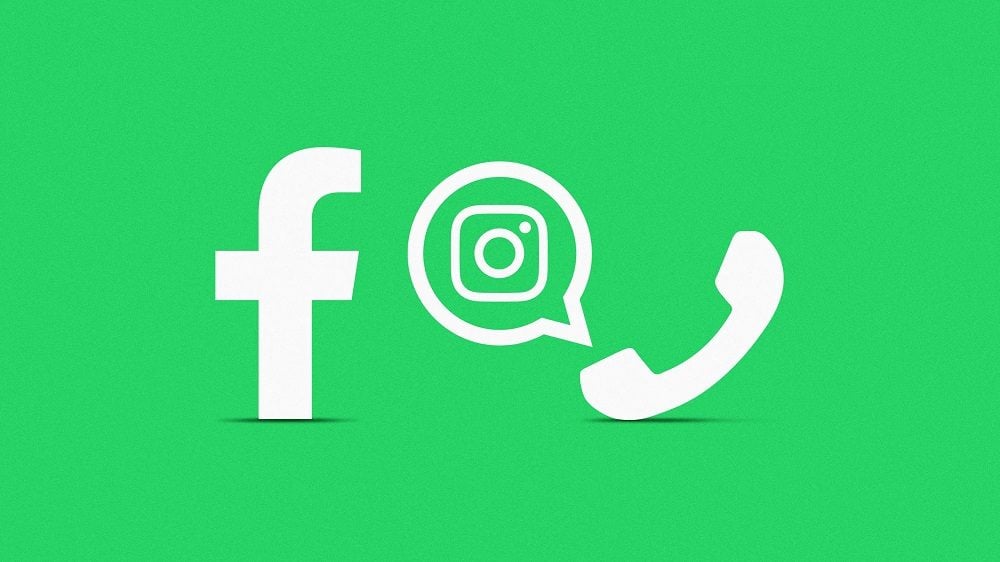
Biggest Business Mergers and Acquisitions in History

Throughout history, the business landscape has witnessed numerous high-profile mergers and acquisitions that have reshaped industries, consolidated market power, and altered the global economic landscape.
These deals have often involved staggering sums of money, strategic partnerships, and significant integration efforts. Here are some of history’s biggest mergers and acquisitions that have left an indelible mark on the business world.
AOL-Time Warner (2018) – $84 billion
At the turn of the millennium, the merger between America Online (AOL) and Time Warner was hailed as a groundbreaking deal that aimed to revolutionize the media industry. However, it quickly became one of the most notorious mergers in history.
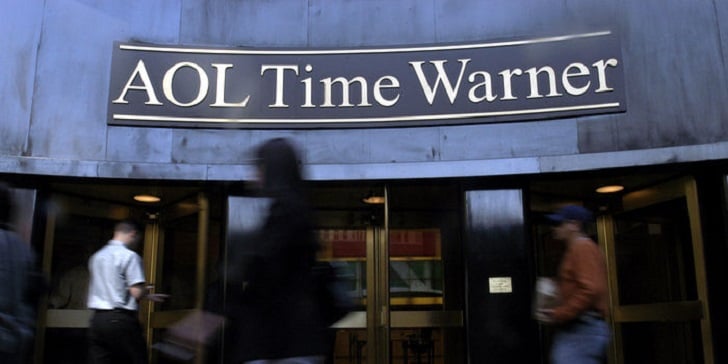
BLOOMBERG NEWS/ WSJ | AT&T acquired Time Warner for $84 billion
Despite its initial promise, the deal faltered due to incompatible corporate cultures, strategic missteps, and the dot-com bubble bursting. The merger resulted in significant losses for both companies, with AOL eventually spun off in 2009.
Vodafone-Mannesmann (2000) – $180 billion
In the same year as the AOL-Time Warner merger, Vodafone, a British telecommunications giant, acquired Germany’s Mannesmann in what was the largest merger in corporate history at that time.
This deal propelled Vodafone to the forefront of the global telecommunications industry, solidifying its position as one of the largest mobile network operators in the world. The acquisition highlighted the growing importance of the telecommunications sector and set the stage for further industry consolidation.
Pfizer-Wyeth (2009) – $68 billion
To diversify its product portfolio and expand its presence in the pharmaceutical market, Pfizer acquired Wyeth in 2009. This merger provided Pfizer with a broader range of drugs, including popular brands such as Advil and ChapStick.
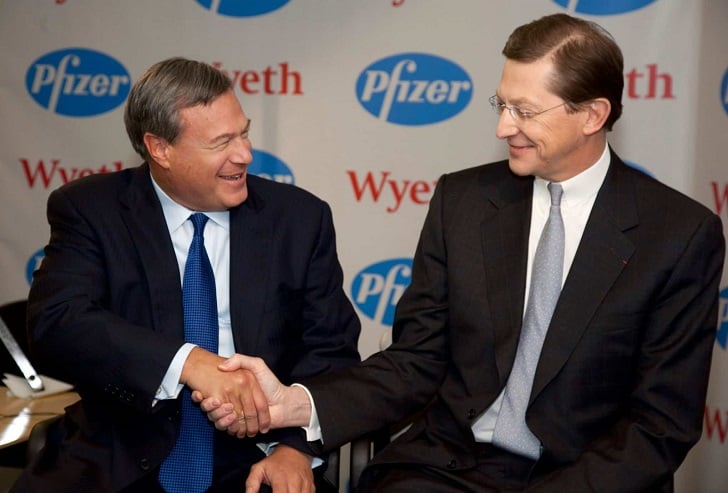
Pharmafile/ AP | Pfizer, which is headquartered in New York City, acquired New Jersey-based Wyeth in 2009
The deal also allowed Pfizer to strengthen its research and development capabilities, enhance its pipeline, and increase its global market share in the pharmaceutical industry.
AB InBev-SABMiller (2016) – $107 billion
The merger between Anheuser-Busch InBev (AB InBev) and SABMiller created the world’s largest beer company, controlling approximately one-third of the global beer market.
The deal brought together iconic beer brands such as Budweiser, Corona, and Miller, enabling AB InBev to expand its presence in emerging markets. The merger faced rigorous regulatory scrutiny, resulting in divestitures and brand sales to address antitrust concerns.
Disney-Fox (2019) – $71.3 billion
The acquisition of 21st Century Fox by The Walt Disney Company marked a significant milestone in the entertainment industry. The deal enabled Disney to expand its content library, gaining access to popular franchises like X-Men, Avatar, and The Simpsons.
With this acquisition, Disney solidified its position as a dominant player in the media and entertainment sector, further strengthening its direct-to-consumer streaming strategy.
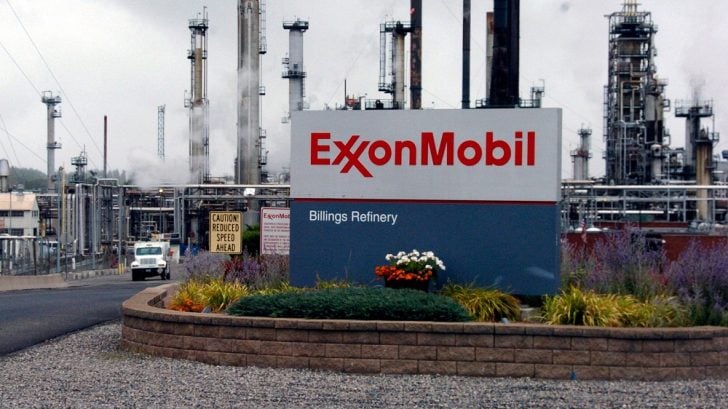
Matthew Brown/ Associated Press | The Exxon/Mobil merger is the largest industrial merger ever
Exxon-Mobil (1999) – $81 billion
The merger of Exxon and Mobil created ExxonMobil, one of the world’s largest publicly traded oil companies. This deal brought together two industry giants and consolidated their resources and expertise. ExxonMobil’s vast scale and global reach allowed the company to influence the oil and gas sector significantly. The merger also signaled the growing consolidation trend within the energy industry.
Facebook-WhatsApp (2014) – $19 billion
Facebook’s acquisition of WhatsApp, a popular messaging app with over a billion users, showcased the growing influence of tech giants in the digital landscape. The deal allowed Facebook to tap into WhatsApp’s massive user base and strengthen its mobile messaging capabilities. It also reflected the increasing importance of mobile communication platforms in the social media and technology sectors.
More in Business
-
Cap Table Management Firm Pulley Gets Featured on Forbes’s Top 50 Fintech Startups
Pulley, a San Francisco-based cap table management firm, is swiftly gaining momentum, challenging industry giants and redefining the landscape for startups...
February 27, 2024 -
Redefining Your Path: 6 Essential Steps for Career Reengineering
So, you’re at a crossroads in your career, contemplating a change that could redefine your professional path or perhaps dreaming of...
February 19, 2024 -
Unsecured Loans: A Deep Dive
When financial needs arise, borrowing money can provide a solution. But which loan products make the most sense for your situation?...
February 16, 2024 -
How to Get Back to Work After a Career Break | 5 Tried & Tested Tips
Taking a career break can feel like you have hit the pause button on a movie. The world continues to move...
February 10, 2024 -
Small-Cap Stocks Could Be Your Biggest Win in 2024 – Here’s Why
In the stock market, where titans like the S&P 500 often steal the spotlight with their record-breaking performances, it is easy...
February 3, 2024 -
4 Things We Learned From the 2024 Golden Globes: A Night of Surprises and Inspirations
The 81st Golden Globes, held on January 7, 2024, was an event that transcended the boundaries of a typical awards ceremony....
January 26, 2024 -
The Path to Wealth: How 3 Productivity Tips Led Me to Multimillionaire Heights
In the pursuit of success, one often encounters the timeless question: How do successful individuals maintain such high levels of productivity?...
January 20, 2024 -
Exciting Career Horizons in 2024: Is Now Your Moment?
As we step into the vibrant landscape of 2024, a question bubbles up in the minds of many: “Is now the...
January 9, 2024 -
Here Are the Top 5 Nickel Stocks to Buy
As you venture into the intriguing world of investing, there is a shiny sector that deserves your attention: Nickel stocks. First...
December 31, 2023





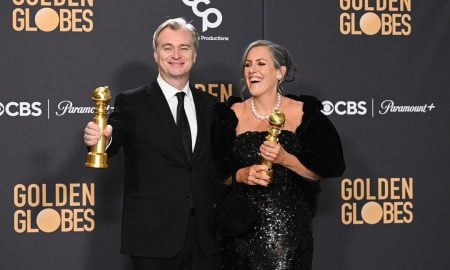


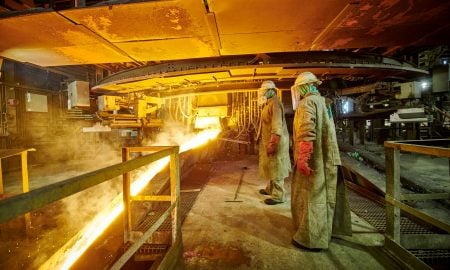
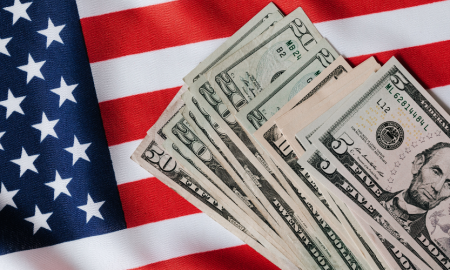




You must be logged in to post a comment Login